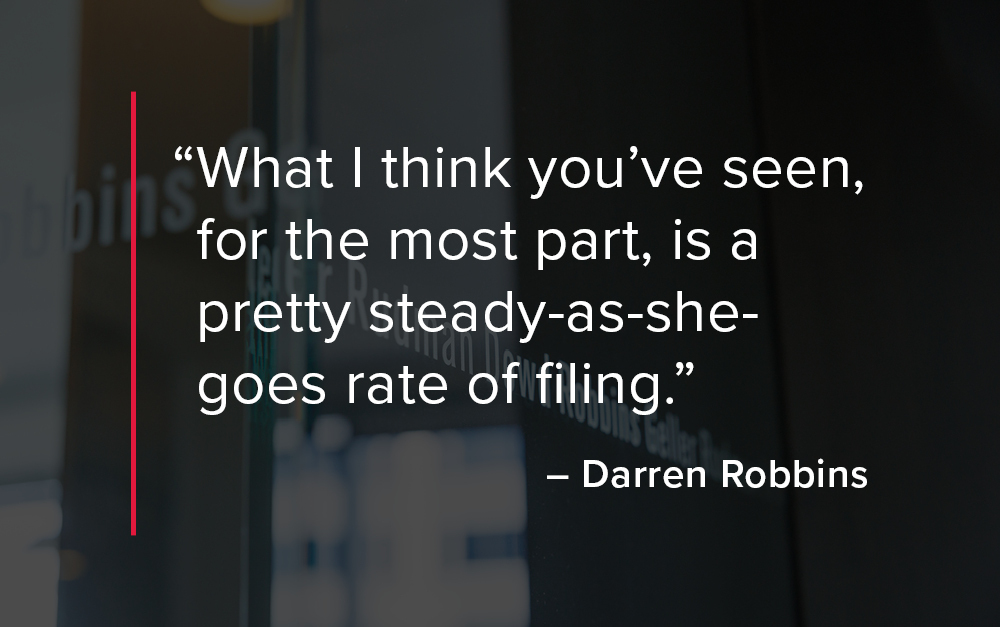A View From Either Side of the Securities Class Action Bar on a ‘Steady’ First Half of 2024

By Ross Todd
The AmLaw Litigation Daily
Reprinted with permission from ALM.
July 31, 2024
The folks at Cornerstone Research went live this morning with their report on securities class action activity in the first half of 2024 and the overall statistics pretty much fall in line with the pace we saw last year.
With 112 new filings in the first half of 2024, the total was a tick higher than the 103 in the second half of 2023, but fell right in line with the 113 filed in the first half of last year. The total number of what Cornerstone calls “core” filings—a tally that excludes lawsuits simply seeking additional disclosures in proposed mergers and acquisitions—inched up from 109 to 110 year-over-year and was, again, a tad higher than the 101 such suits filed in the second half of 2023.
As we did with the year-end numbers earlier this year, we’ve once again tapped a couple of top practitioners from either side of the securities bar to dig into what’s going on behind the numbers. This time we connected with Darren Robbins of Robbins Geller Rudman & Dowd and Jonathan Youngwood of Simpson Thacher & Bartlett.
“This is actually a pretty steady line report going back year-over-year,” Youngwood said. He did note that with M&A filings taking a dip and the overall number of filings staying steady, that means the non-M&A filings are ticking up.
Robbins said that “certain folks with an agenda” from time to time have emphasized what he perceived as “modest moves that are standard deviations from the norm” to try to make a point about the quality of the cases being filed. But he said other than blips here and there, there’s been nothing on the scale of changes in filing volumes brought about by the Private Securities Litigation Reform Act nearly three decades ago or the global financial crisis a decade and a half ago. “What I think you’ve seen, for the most part, is a pretty steady-as-she-goes rate of filing,” Robbins said.
For the first time in this report, Cornerstone began tracking artificial intelligence-related filings. The report’s authors note that while AI-related filings are not necessarily a new thing, the growing prominence of AI in the business models of many publicly traded companies is expected to lead to an increase in those filings. Indeed, the first half of 2024 saw six AI-related filings, which matched or exceeded the number of AI-related cases filed in the full year for each year going back to 2020 except for 2021, when there were eight filings.
Still, Robbins said breaking out the AI-related cases amounted to something of a “TikTok moment.” He said the attention to AI cases, with just six filed in a half-year, reminded him of previous reports that focused on the volume of cases brought in state court under the Securities Act of 1933. “People jumped up and down about total settlements each year of maybe $100 or $150 million, which just don’t seem to move the needle,” he said.
“I don’t make the distinctions in filing my cases for my clients between an accounting case and a cryptocurrency case and a COVID-19 case,” he said. “Fraud is fraud and it takes on whatever hue it takes on.”
Simpson Thacher’s Youngwood said he didn’t disagree.
“A case is a case,” Youngwood said. “When we’re talking to clients, who wake up one day and get involved in [a case], we tell them their industry matters, the specifics matter tremendously,” he said. “But at the back of it all, you’ve got a very established set of case law in most areas that apply equally to whether you’re a bank or an AI company or you’re an insurance company.”
In most of the other trend-driven filings that Cornerstone has tracked in recent reports, including those with claims related to cryptocurrency, cybersecurity, SPACs and the early 2023 turbulence in the banking sector, there was a drop in new filings in the first half of the year. That was especially the case in terms of the banking turbulence cases, which saw no new filings. The report notes that this possibly reflects greater stability in the banking sector.
The Cornerstone authors, however, did note an uptick in new filings related to COVID-19, with seven in the first half. Those cases, which the report notes often include allegations related to the pandemic’s impact on product demand, are on pace to exceed the 11 new filings for all of last year.
Reprinted with permission from the July 31, 2024 edition of the AMLAW LITIGATION DAILY © 2024 ALM Global Properties, LLC. All rights reserved. Further duplication without permission is prohibited, contact 877-256-2472 or asset-and-logo-licensing@alm.com. # AMLAW-8022024-57874
To view the original article, click here.
Attorneys
Practice Areas
Read More Firm News
- December 4, 2025
- October 10, 2025
- October 8, 2025
- September 8, 2025
- August 20, 2025